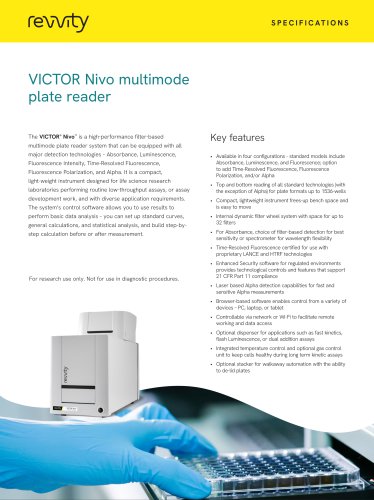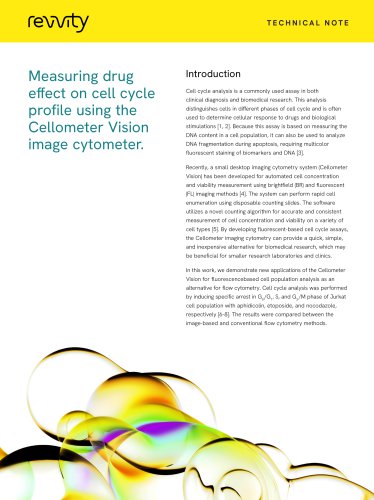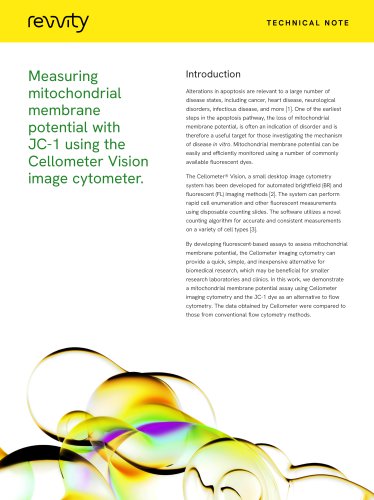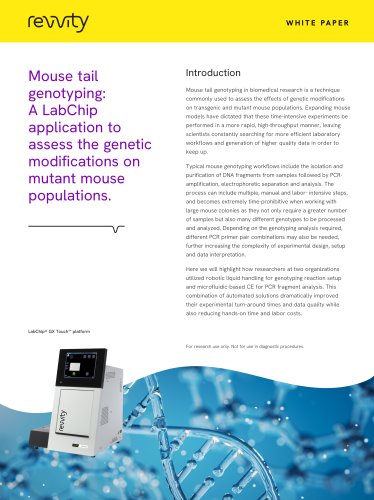
Catalog excerpts
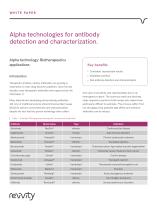
WHITE PAPER Alpha technology: Biotherapeutics applications Introduction Therapeutic proteins, namely antibodies, are growing in importance in many drug discovery pipelines. Since the last decade, many therapeutic antibodies were approved by the FDA (Table 1)1. Many laboratories developing and producing antibodies still rely on traditional enzyme-linked immunosorbent assay (ELISA) to perform clonal selection and characterization despite the fact that this proven technology often suffers Key benefits • Consistent, reproducible results • Simplified workflow • Fast antibody detection and characterization V_) from lack of sensitivity and reproducibility due to its heterogenous nature. The numerous wash and blocking steps required to perform ELISA assays also makes them particularly difficult to automate. This process suffers from low throughput and potential high affinity and selective antibodies can be missed. I Table 1: Example FDA approved therapeutic monoclonal antibodies.
Open the catalog to page 1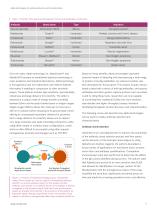
Alpha technologies for antibody detection and characterization. Table 1: Example FDA approved therapeutic monoclonal antibodies. (continued) Brand name Transplant rejection Multiple sclerosis and Crohn’s disease Allergy-related asthma Respiratory Syncytial Virus Colorectal cancer Macular degeneration Rituxan®, Mabthera® Non-Hodgkin lymphoma Non-Hodgkin lymphoma Breast cancer Over the years, Alpha technology (i.e. AlphaScreen® and Based on these benefits, Alpha technologies represent AlphaLISA®) became an established detection technology in powerful means of detecting and characterizing a...
Open the catalog to page 2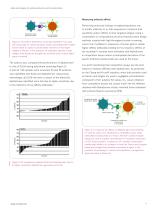
Alpha technologies for antibody detection and characterization. Measuring antibody affinity Hybridoma Performing molecular biology re-engineering allows one to modify antibody Fc or Fab sequences to enhance their Biotin antigen Streptavidin-coated Alpha Donor Beads Anti-human IgG Fc Acceptor Beads Figure 2: To perform hybridoma screening, Vainshtein et al used anti-human IgG Fc-coated Acceptor beads and Streptavidin-coated Donor beads to capture a biotinylated derivative of the target antigen of interest. In the presence of antibodies specific to that antigen, both beads are brought into...
Open the catalog to page 3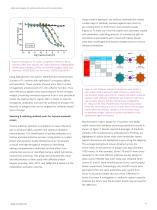
Alpha technologies for antibody detection and characterization. Using a matrix approach, the authors systematically tested a wide range of antibody samples against each other by % Maximal Signal pre-coating them on both Donor and Acceptor beads (Figure 6). To make sure that the beads were optimally loaded with antibodies, saturating amounts of commercial IgGs or hybridoma supernatants were mixed with beads. Beads were then centrifuged and washed multiple times to remove unbound antibodies. Figure 5: Examples of Fc variant competition isotherms. Black asterisk, buffer; gray squares, WT;...
Open the catalog to page 4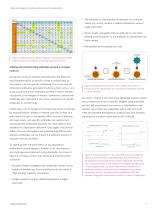
Alpha technologies for antibody detection and characterization. • The antibody to characterize and present in a complex matrix (e.g. serum, ascites) is added followed by another single wash step • Donor beads conjugated with an antibody (or any other binding protein) specific to the antibody to characterize are finally added • Microplates are incubated and read Anti-species IgG Fc Donor Beads Figure 7: Representative matrix design for 18 positive anti-NAEβ rabbit monoclonal antibody-producing hybridoma clones. IgG sample (serum or hybridoma) Antigen Utilizing and characterizing antibodies...
Open the catalog to page 5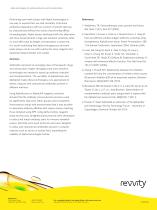
Alpha technologies for antibody detection and characterization. Performing semi-wash assays with Alpha technologies is one way to expand their use and versatility. Polyclonal antibody preparations with low content of specific IgG may be characterized without the needs of performing affinity References 1. Waldmann, TA. Immunotherapy: past, present and future. Nat. Med. 9 (3) 2, 269–277 (2003). chromatography. Alpha assays developed with this alternative 2. Vainshtein I, Kurose S, Vickroy J, Russell Grove J, Liang M. still show broad dynamic range and excellent sensitivity while Fast and...
Open the catalog to page 6All Revvity catalogs and technical brochures
-
Model 307 Sample Oxidizer
3 Pages
Archived catalogs
-
chemagic Prepito® instrument
4 Pages
-
chemagic 360 instrument
4 Pages



